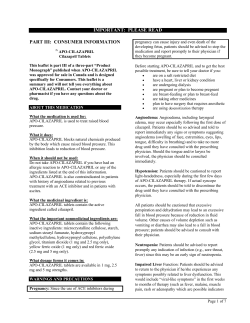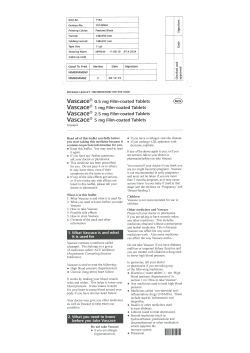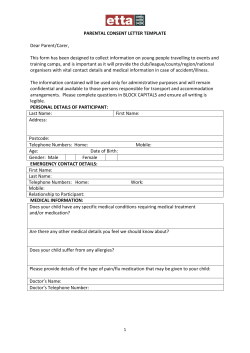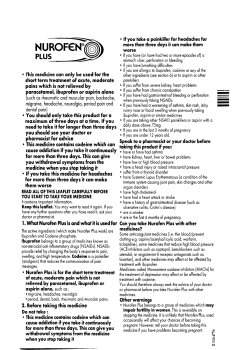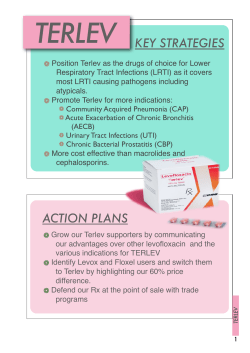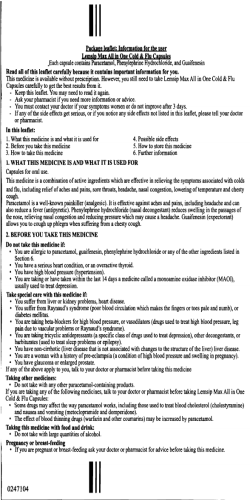
Medication Information for Parents and Teachers Methylphenidate—Methylin, Ritalin, Metadate, Concerta, Daytrana, Focalin
Medication Information for Parents and Teachers Methylphenidate—Methylin, Ritalin, Metadate, Concerta, Daytrana, Focalin General Information About Medication Each child and adolescent is different. No one has exactly the same combination of medical and psychological problems. It is a good idea to talk with the doctor or nurse about the reasons a medicine is being used. It is very important to keep all appointments and to be in touch by telephone if you have concerns. It is important to communicate with the doctor, nurse, or therapist. It is very important that the medicine be taken exactly as the doctor instructs. However, once in a while, everyone forgets to give a medicine on time. It is a good idea to ask the doctor or nurse what to do if this happens. Do not stop or change a medicine without asking the doctor or nurse first. If the medicine seems to stop working, it may be because it is not being taken regularly. The youth may be “cheeking” or hiding the medicine or forgetting to take it (especially at school). The doses may be too far apart, or a different dose may be needed. Something at school, at home, or in the neighborhood may be upsetting the youth, or he or she may need special help for learning disabilities or tutoring. Please discuss your concerns with the doctor. Do not just increase the dose. All medicines should be kept in a safe place, out of the reach of children, and should be supervised by an adult. If someone takes too much of a medicine, call the doctor, the poison control center, or a hospital emergency room. Each medicine has a “generic” or chemical name. Just like laundry detergents or paper towels, some medicines are sold by more than one company under different brand names. The same medicine may be available under a generic name and several brand names. The generic medications are usually less expensive than the brand name ones. The generic medications have the same chemical formula, but they may or may not be exactly the same strength as the brand-name medications. Also, some brands of pills contain dye that can cause allergic reactions. It is a good idea to talk to the doctor and the pharmacist about whether it is important to use a specific brand of medicine. All medicines can cause an allergic reaction. Examples are hives, itching, rashes, swelling, and trouble breathing. Even a tiny amount of a medicine can cause a reaction in patients who are allergic to that medicine. Be sure to talk to the doctor before restarting a medicine that has caused an allergic reaction. Taking more than one medicine at the same time may cause more side effects or cause one of the medicines to not work as well. Always ask the doctor, nurse, or pharmacist before adding another medicine, whether prescription or over-the-counter. Be sure that each doctor knows about all of the medicines your child is taking. Also tell the doctor about any vitamins, herbal medicines, or supplements your child may be taking. Some of these may have side effects alone or when taken with this medication. Everyone taking medicine should have a physical examination at least once a year. If you suspect the youth is using drugs or alcohol, please tell the doctor right away. Pregnancy requires special care in the use of medicine. Please tell the doctor immediately if you suspect the teenager is pregnant or might become pregnant. Page 2 of 8 Medication Information for Parents and Teachers Printed information like this applies to children and adolescents in general. If you have questions about the medicine, or if you notice changes or anything unusual, please ask the doctor or nurse. As scientific research advances, knowledge increases and advice changes. Even experts do not always agree. Many medicines have not been approved by the U.S. Food and Drug Administration (FDA) for use in children. For this reason, use of the medicine for a particular problem or age group often is not listed in the Physicians’ Desk Reference. This does not necessarily mean that the medicine is dangerous or does not work, only that the company that makes the medicine has not received permission to advertise the medicine for use in children. Companies often do not apply for this permission because it is expensive to do the tests needed to apply for approval for use in children. Once a medication is approved by the FDA for any purpose, a doctor is allowed to prescribe it according to research and clinical experience. Note to Teachers It is a good idea to talk with the parent(s) about the reason(s) that a medication is being used. If the parent(s) sign consent to release information, it is often helpful to talk with the doctor. If the parent(s) give permission, the doctor may ask you to fill out rating forms about your experience with the student’s behavior, feelings, academic performance, and medication side effects. This information is very useful in selecting and monitoring medication treatment. If you have observations that you think are important, do not hesitate to share these with the student’s parent(s) and treating clinicians. It is very important that the medicine be taken exactly as the doctor instructs. However, everyone forgets to give a medicine on time once in a while. It is a good idea to ask the parent(s) in advance what to do if this happens. Do not stop or change the time you are giving a medicine at school without parental permission. If a medication is to be taken with food, but lunchtime or snack time changes, be sure to notify the parent(s) so appropriate adjustments can be made. All medicines should be kept in a secure place and should be supervised by an adult. If someone takes too much of a medicine, follow your school procedure for an urgent medical problem. Taking medicine is a private matter and is best managed discreetly and confidentially. It is important to be sensitive to the student’s feelings about taking medicine. If you suspect that the student is using drugs or alcohol, please tell the parent(s) or a school counselor right away. Please tell the parent(s) or school nurse if you suspect medication side effects. Modifications of the classroom environment or assignments may be useful in addition to medication. The student may need to be evaluated for additional help or for an Individualized Education Plan for learning or behavior. Any expression of suicidal thoughts or feelings or self-harm by a child or adolescent is a clear signal of distress and should be taken seriously. These behaviors should not be dismissed as “attention seeking.” What Is Methylphenidate (Methylin, Ritalin, Metadate, Concerta, Daytrana, Focalin)? Methylphenidate is called a stimulant. It is used to treat attention-deficit/hyperactivity disorder (ADHD or ADD), whether the person has hyperactivity (increased moving around) or not. It comes in a generic form and several brand name formulations (see table below). Although all of these medicines have methylphenidate as the active ingredient, they are made differently, so that there are many different ways to take methylphenidate. This helps the doctor to find just the right form of the medicine for each person. Methylphenidate—Methylin, Ritalin, Metadate, Concerta, Daytrana, Focalin Page 3 of 8 Generic and brand name formulations Short-acting or immediate-release methylphenidate (3–4 hours) Generic methylphenidate Methylin tablets Methylin CT chewable tablets Methylin oral solution (grape flavored) Ritalin Long-acting methylphenidate Methylin ER (extended-release; 6–8 hours) (wax matrix) Ritalin SR (sustained-release; 6–8 hours) (wax matrix) Metadate ER (extended-release; 6–8 hours) (wax matrix) Metadate CD (controlled-delivery; 8 hours) (capsule Diffucap with beads; may be sprinkled on food) Very long-acting methylphenidate Ritalin LA (long-acting; 8–10 hours) (capsule with beads; may be sprinkled on food) Concerta (Oros osmotic controlled-release tablet; 10–12 hours) Daytrana Transdermal System (skin patch; worn for 9 hours; lasts 12 hours) Dexmethylphenidate is a form of methylphenidate that has only one of the two chemical shapes (called a dextroisomer) of methylphenidate. Dexmethylphenidate is given at half the dose of methylphenidate and may have fewer side effects. Dexmethylphenidate comes in brand name Focalin (immediate-release, short-acting tablets; 3–4 hours) and Focalin XR (extended-release, very long-acting capsules that contain beads of medicine; 8–10 hours; may be sprinkled on food). How Can This Medicine Help? Methylphenidate can increase attention and the ability to follow instructions. It can improve attention span, decrease distractibility, increase the ability to finish things, decrease hyperactivity, and improve the ability to think before acting (decrease impulsivity). Handwriting and completion of schoolwork and homework can improve. Methylphenidate can improve willingness to follow directions and decrease stubbornness in youngsters with both ADHD and oppositional defiant disorder. Many people with Tourette’s disorder (chronic motor and vocal tics) also have symptoms of ADHD. Methylphenidate may be used cautiously to reduce the symptoms of hyperactivity, impulsivity, and trouble paying attention and usually does not make the tics worse. If the tics get worse, talk with your child’s doctor. Lowering the dose or stopping the methylphenidate will usually lead to the tics decreasing again. Tics also increase and decrease for a lot of reasons that are not related to medicine. Medicine may not remove all symptoms in children with ADHD. These youth may also need special help in school and behavior modification at home and at school. Some youngsters and families are helped by family therapy or group social skills therapy. Stimulant medicines last for different amounts of time. ADHD symptoms may come back when the medicine wears off. This does not mean the medicine is not working but that longer coverage may be needed. Methylphenidate is also used to help people with narcolepsy (sudden and uncontrollable episodes of deep sleep) to stay awake. Page 4 of 8 Medication Information for Parents and Teachers How Does This Medicine Work? In people who have ADHD or ADD, parts of the brain are not working as well as they should. An example would be the part that controls impulsive actions (“the brakes”). Methylphenidate helps these parts of the brain work better by acting as a stimulant, increasing the activity of neurotransmitters—mostly dopamine but also norepinephrine. Neurotransmitters are the chemicals that the brain makes for the nerve cells to communicate with each other. Methylphenidate is not a tranquilizer or sedative. It works in the same way in children and adults and in people with or without ADHD. Methylphenidate and amphetamine are both stimulant medicines, but they work in different ways on the neurotransmitters. A person with ADHD might be helped by one stimulant but not the other, so if one is not working, the doctor may try the other one. How Long Does This Medicine Last? All pill types of methylphenidate start working within 30–60 minutes after taking them. Different forms of methylphenidate last for different lengths of time. The immediate-release or shortacting forms last for 3–4 hours. The long-acting forms last for 6–8 hours. Ritalin LA and Focalin XR last for 8–10 hours, and Concerta lasts for 10–12 hours. The length of time is different for different people, and the medicine may work longer for some symptoms than for others. An advantage of the longer-acting forms is that they do not have to be given during the school day. Daytrana (the skin patch) may take longer to start working (1–2 hours after being put on the skin). It is designed to be worn for 9 hours. The effects of the medicine last as long as 3 hours after the skin patch is taken off. If there are too many side effects in the evening, the patch can be taken off earlier in the day. How Will the Doctor Monitor This Medicine? The doctor will review your child’s medical history and physical examination before starting methylphenidate. The doctor may order some blood or urine tests to be sure your child does not have a hidden medical condition. Be sure to tell the doctor if your child or anyone in the family has had heart problems, very fast or irregular heartbeat, high blood pressure (hypertension), dizziness, fainting, shortness of breath, or severe tiredness. Tell the doctor if anyone in the family has died suddenly. Also tell the doctor if your child or anyone in the family has had motor or vocal tics (hard-to-control repeated movements or sounds) or Tourette’s disorder (also called Tourette’s syndrome). The doctor or nurse will measure your child’s height, weight, pulse, and blood pressure before starting the medicine. The doctor will usually ask parents and teachers to fill out behavior rating scales (checklists). After the medicine is started, the doctor will want to have regular appointments with you and your child to see how the medicine is working, to see if a dose change is needed, to watch for side effects, to see if methylphenidate is still needed, and to see if any other treatment is needed. The doctor or nurse may check your child’s height, weight, pulse, and blood pressure. With parental permission, the doctor will usually ask for reports (rating scale, checklist, testing results, comments) from the teacher(s) to keep track of progress in learning and behavior. Some young people take the medicine three or four times a day, every day. Others need to take it only once or twice a day, or only on school days. You and your child’s doctor will work out the dose, timing, and type of methylphenidate that is best for your child and his or her symptoms and schedule. Methylphenidate—Methylin, Ritalin, Metadate, Concerta, Daytrana, Focalin Page 5 of 8 What Side Effects Can This Medicine Have? Any medicine can have side effects, including an allergy to the medicine. Because each patient is different, the doctor will monitor the youth closely, especially when the medicine is started. The doctor will work with you to increase the positive effects and decrease the negative effects of the medicine. Please tell the doctor if any of the listed side effects appear or if you think that the medicine is causing any other problems. Not all of the rare or unusual side effects are listed. Side effects are most common after starting the medicine or after a dose increase. Many side effects can be avoided or lessened by starting with a very low dose and increasing it slowly—ask the doctor. Allergic Reaction Tell the doctor in a day or two (if possible, before the next dose of medicine): • Hives • Itching • Rash A rash under the patch may be a problem with the skin patch, and there may also be bumps, blisters, or swelling. After using the skin patch, a new allergy to methylphenidate pills may develop. Stop the medicine and get immediate medical care: • Trouble breathing or chest tightness • Swelling of lips, tongue, or throat Common Side Effects If the following side effects do not go away after about 2 weeks, ask the doctor about lowering your child’s dose. • Lack of appetite and weight loss—Encourage your child to eat a good breakfast and afternoon and evening snacks; give medicine during or after meals. • Insomnia (trouble falling asleep)—This may be the ADHD coming back and not a side effect. Talk with your child’s doctor. Changing the time or dose of medicine, starting a bedtime routine, or adding another medicine may help. • Headaches • Stomachaches • Irritability, crankiness, crying, emotional sensitivity • Loss of interest in friends • Staring into space • Rapid pulse rate (heartbeat) or increased blood pressure Preschool-age children are more likely than older children to have irritability, emotional sensitivity, lack of appetite, and/or insomnia. Page 6 of 8 Medication Information for Parents and Teachers Less Common Side Effects Tell the doctor within a week or two: • Rebound—As the medicine is wearing off, hyperactivity or bad mood may get worse than before the medicine was taken. The doctor can make adjustments to help this problem. • Slowing of growth—This is why your child’s height and weight are checked regularly; if this is a problem, growth usually catches up if the medicine is stopped or the dose is decreased. • Nervous habits—Examples are picking at skin or biting nails (although these habits are also common in children with ADHD who do not take medicine). • Stuttering Rare, but Serious, Side Effects Call the doctor within a day or two: • Motor or vocal tics (fast, repeated movements or sounds) or muscle twitches (jerking movements) of parts of the body • Sadness that lasts more than a few days • Auditory, visual, or tactile hallucinations (hearing, seeing, or feeling things that are not there) • Any behavior that is very unusual for your child Some Interactions With Other Medicines or Food Please note that the following are only the most likely interactions with food or other medicines. Caffeine may increase side effects. Methylphenidate may be taken with or without food. The combination of methylphenidate with medicines such as imipramine (Tofranil) or nortriptyline (Pamelor) may cause irritability and confusion or severe emotional and behavioral problems (such as hallucinations and fighting). However, methylphenidate with either of these two medicines rarely may be used together, very carefully. It is not a good idea to combine stimulants with nasal decongestants or cough and cold medicines that contain ingredients such as pseudoephedrine or phenylephrine because rapid pulse rate (heartbeat) or high blood pressure may develop. If a stuffy nose is really troublesome, it is better to use a nasal spray. Check with the pharmacist before giving an over-the-counter medicine. Also, many children with ADHD become cranky or more hyperactive while taking antihistamines (such as Benadryl). If medicine for allergies is needed, ask your child’s doctor. Methylphenidate may increase the levels of selective serotonin reuptake inhibitor (SSRI) antidepressants (such as Prozac, Paxil, Zoloft, and Celexa). Methylphenidate should not be taken at the same time as or even within a month of taking another type of medicine called a monoamine oxidase inhibitor (MAOI), such as Eldepryl (selegiline), Nardil (phenelzine), Parnate (tranylcypromine), or Marplan (isocarboxazid). The combination could cause severe high blood pressure. Methylphenidate—Methylin, Ritalin, Metadate, Concerta, Daytrana, Focalin Page 7 of 8 What Could Happen if This Medicine Is Stopped Suddenly? No medical withdrawal effects occur if methylphenidate is stopped suddenly. The ADHD will come back as soon as the medicine wears off. Some people may have irritability, trouble sleeping, or increased hyperactivity for a day or two if they have been taking the medicine every day for a long time, especially at high doses. It may be better to decrease the medicine slowly (taper) over a week or so. How Long Will This Medicine Be Needed? There is no way to know how long a person will need to take methylphenidate. The parent(s), the doctor, and the school will work together to determine what is right for each patient. Sometimes the medicine is needed for a few years, but many people need to take medicine for ADHD even as adults. What Else Should I Know About This Medicine? Many people have incorrect information about stimulants. If you hear anything that worries you, please check with your doctor. Although the FDA has not approved methylphenidate for use in children younger than 6 years, this is not because it is dangerous or does not work. It is because there was not enough research on young children at the time that methylphenidate was approved by the FDA. Now there is research that shows that methylphenidate can be used safely and effectively in preschool children with ADHD. Amphetamines are FDA approved for children younger than 6 years, but this is a historical accident that happened as rules changed for approval of medicines. There is actually less research on amphetamines for ADHD in young children than there is for methylphenidate. Stimulants do not cause drug use or addiction. However, because the patient or other people (especially if they have a history of drug abuse) may abuse these medicines, adult supervision is especially important. Some teenagers may try to sell or share their medicine, so it should be kept in a secure place and given by an adult. Methylphenidate will not help people who do not have ADHD to get better grades or do better on tests, but some people think that it will, so they try to take someone else’s medicine. The government considers methylphenidate to be a controlled substance. There are special rules for how much of this medicine may be prescribed at one time and how soon prescriptions must be filled after they are written. Prescriptions may not have refills and may not be telephoned to the pharmacy. The doctor must write a new prescription for stimulants each time, and prescriptions may not be written with a date in the future. Prescriptions may be mailed or picked up at the doctor’s office. It is important for the child not to chew or crush any of the long-acting tablets or capsules because doing so releases too much medicine all at once. Empty Concerta shells will pass through the digestive system and may be seen in bowel movements. This is harmless. If the patient has trouble swallowing, Concerta may be difficult to swallow or may even get stuck. For children who cannot swallow pills, a variety of options is available. The capsule long-acting forms may be opened and the tiny beads inside sprinkled onto a spoonful of applesauce. The mixture of applesauce and medicine should be swallowed without chewing. However, the medicine should not be mixed into food and stored, and the beads should not be mixed in liquid. The skin patch may be useful for children who need a long-acting form but who cannot or will not swallow pills. Short-acting methylphenidate in chewable and liquid forms is also available. Page 8 of 8 Medication Information for Parents and Teachers When using Daytrana (the patch), a new patch is applied to the skin each day. Put the patch on 2 hours before the medicine needs to work. Remove half the liner and put the patch onto clean, dry skin on the hip area, below the waist. Peel off the rest of the liner and stick the whole patch onto the skin. Do not touch the sticky parts of the patch with the hands. Press the patch down with the palm of the hand for 30 seconds, to be sure the patch is firmly attached. It is best to alternate sides daily and to put the patch onto a different part of the skin each day. Do not use a patch more than once. After taking the patch off, fold it in half, sticky side in, and throw it away. If a young child or a pet might take it out of the trash can, flush the patch down the toilet instead of throwing it into the trash. Some of these medicines have similar names but have different strengths or last different amounts of time (for example, Metadate ER and Metadate CD, or Ritalin LA and Ritalin SR). Be sure to check your prescription to be sure you have the correct medicine from the pharmacy. Notes Use this space to take notes or to write down questions you want to ask the doctor. Copyright © 2007 American Psychiatric Publishing, Inc. The purchaser of this book is licensed to distribute copies of these forms in limited amounts. Please see copyright page for further information. The authors have worked to ensure that all information in this book concerning drug dosages, schedules, routes of administration, and side effects is accurate as of the time of publication and consistent with standards set by the U.S. Food and Drug Administration and the general medical community and accepted child psychiatric practice. The information on this medication sheet does not cover all the possible uses, precautions, side effects, or interactions of this drug. For a complete listing of side effects, see the manufacturer’s package insert, which can be obtained from your physician or pharmacist. As medical research and practice advance, therapeutic standards may change. For this reason and because human and mechanical errors sometimes occur, we recommend that readers follow the advice of a physician who is directly involved in their care or the care of a member of their family. From Dulcan MK (editor): Helping Parents, Youth, and Teachers Understand Medications for Behavioral and Emotional Problems: A Resource Book of Medication Information Handouts, Third Edition. Washington, DC, American Psychiatric Publishing, 2007
© Copyright 2026




